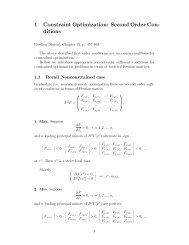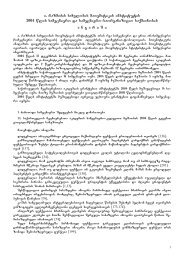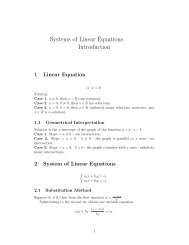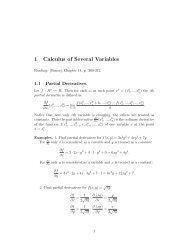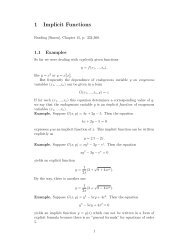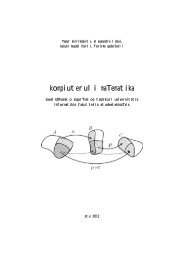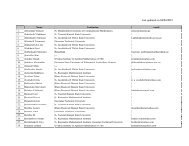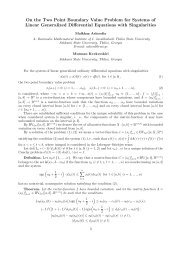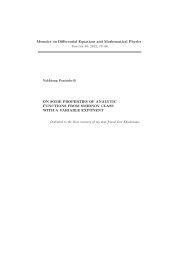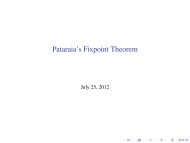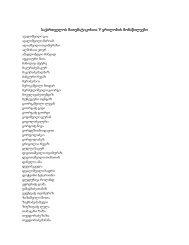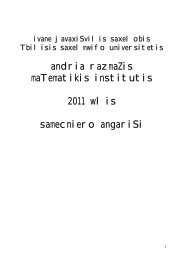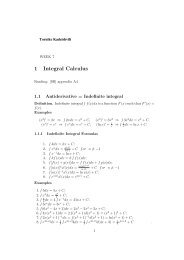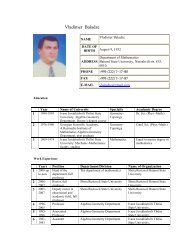36 T. S. Aleroev, H. T. Aleroeva, Ning-Ming Nie, and Yi-Fa TangwhereG(x, x) = 0,ddx G(x, ξ) ∣∣∣∣ξ=x= 1.From Marchenko’s results it follows that the operator A is linearly equivalentto the operator of repeated integration [9]J 2 y =∫ x0(x − ξ)y(ξ) dξ,where y(ξ) ∈ L 2 [0, 1].In the present paper, similar results we will be obtained for the differentialequations of the fractional order σ (1 < σ ≤ 2). In what follows, wewill use the operators of fractional differentiation of M. M. Dzhrbashyan [9],which are defined as follows.Consider a problem of Cauchy typeJ{y; γ 0 , γ 1 , γ 2 } = D σ 2y − {λ + q(x)}y = 0, x ∈ (0, 1], (1.17)dd∣ = C 0 , ∣ = C 1 ,x=0 x=0(1.18)dx Dσ 0dx Dσ 1where q(x) ∈ C[0, 1].Note that some results of this paper have been published earlier in [1],[7]. In those works, operator of transformation translating a solution ofthe equation (1.18) to a solution of the equation D σ 2y − λy = 0 has beenconstructed. Let y(x, λ) be a solution of a problem of Cauchy type. Thenit is known [2] that the identityy(x; λ) = C 0 x µ0−1 E ρ (λx 1/ρ ; µ 0 ) + C 1 x µ1−1 E ρ (λx 1/ρ ; µ 1 )++∫ x0((x − τ) 1/ρ E ρ λ(x − τ) 1/ρ ; 1 )q(τ)y(τ; λ) dτ (1.19)ρholds, where∞∑ z kE ρ (x, µ) =Γ ( )µ + k (1.20)k=0 ρis a function of Mittag–Leffler type.In what follows, we will consider the case where C 0 = 0, C 1 = 1, λ = iz,Im z = 0, µ 1 = 1, |q(x)| < 1. As µ 1 = 1, we have(see [5]). In [7],y(x; λ) = x µ 1−1 E ρ (λx 1/ρ ; µ 1 )++|E ρ (λx 1/ρ ; µ 1 )| ≤ Cx −1/ρ (1 ≤ x < ∞)∫ x0((x − τ) 1/ρ−1 E ρ λ(x − τ) 1/ρ ; 1 )q(τ)y(τ; λ) dτ, (1.21)ρ
Boundary Value Problems for Differential Equations of Fractional Order 37From the general Volterra theory it follows that the equation (1.21) can besolved by a method of iterations. Since the function q(x) is continuous, wehavewhereϕ n (λ, x) =y(x, λ) = E ρ (λx 1/ρ ; µ 1 ) + ϕ 1 (λ, x) + ϕ 2 (λ, x) + · · · , (1.22)∫ x0dτ 1 · · ·∫τ n−10dτ 1 · · · q(τ n )E ρ (λ(x − τ 1 ) 1/ρ ; µ 1 ) · · · ×× E ρ (λ(τ n−1 − τ n ) 1/ρ ; µ 1 )E ρ (λτ 1/ρn ; µ 1 ).Obviously the series (1.22) converges in regular intervals in each interval(0; l), l < 1.Theorem 1.7. There is an operator of transformation V , transforminga solution E ρ (λx 1/ρ ; µ 1 ) of the equation (1.19) into a solution y(x; λ) of theequation (1.17).holds.Lemma 1.2. The equality(J − λJ 1/ρ ) −1 1Γ(ρ −1 ) = E ρ(λx 1/ρ ; 1) (1.23)Proof. Let f(x) ∈ L 1 (0, 1), ρ > 0 and λ be any complex parameter. Thenthe integral equationhas a unique solutionu(x) = f(x) + λu(x) = f(x) +λΓ(ρ −1 )belonging to the class L 1 (0, 1).In (1.24), let f(x) = 1Γ(ρ −1 ). We obtain∫ x0u(x) =∫ x0(x − 1) 1/ρ u(t) dt (1.24)((x − t) 1/ρ−1 E ρ λ(x − t) 1/ρ ; x )f(t) dt (1.25)ρ1Γ(ρ −1 ) + 1Γ(ρ −1 )Due to (1.25) and (1.26), we haveu(x) =1Γ(ρ −1 ) + 1Γ(ρ −1 )Using the known formula of M. M. Dzhrbashyan∫ x0∫ x0(x − t)u(t) dt. (1.26)((x − t) 1/ρ−1 E ρ λ(x − t) 1/ρ ; x )dt. (1.27)ρ
- Page 4 and 5: 24 T. S. Aleroev, H. T. Aleroeva, N
- Page 8 and 9: 28 T. S. Aleroev, H. T. Aleroeva, N
- Page 10 and 11: 30 T. S. Aleroev, H. T. Aleroeva, N
- Page 12 and 13: 32 T. S. Aleroev, H. T. Aleroeva, N
- Page 14 and 15: 34 T. S. Aleroev, H. T. Aleroeva, N
- Page 18 and 19: 38 T. S. Aleroev, H. T. Aleroeva, N
- Page 20 and 21: CHAPTER 2The Sturm-Liouville Proble
- Page 22 and 23: 42 T. S. Aleroev, H. T. Aleroeva, N
- Page 24 and 25: 44 T. S. Aleroev, H. T. Aleroeva, N
- Page 26 and 27: 46 T. S. Aleroev, H. T. Aleroeva, N
- Page 28 and 29: 48 T. S. Aleroev, H. T. Aleroeva, N
- Page 30 and 31: 50 T. S. Aleroev, H. T. Aleroeva, N
- Page 32 and 33: 52 T. S. Aleroev, H. T. Aleroeva, N
- Page 34 and 35: 54 T. S. Aleroev, H. T. Aleroeva, N
- Page 36 and 37: 56 T. S. Aleroev, H. T. Aleroeva, N
- Page 38 and 39: 58 T. S. Aleroev, H. T. Aleroeva, N
- Page 40 and 41: 60 T. S. Aleroev, H. T. Aleroeva, N
- Page 42 and 43: 62 T. S. Aleroev, H. T. Aleroeva, N
- Page 44 and 45: 64 T. S. Aleroev, H. T. Aleroeva, N
- Page 46 and 47: CHAPTER 3Solving Two-Point Boundary
- Page 48 and 49: 68 T. S. Aleroev, H. T. Aleroeva, N
- Page 50 and 51: 70 T. S. Aleroev, H. T. Aleroeva, N
- Page 52 and 53: 72 T. S. Aleroev, H. T. Aleroeva, N
- Page 54 and 55: 74 T. S. Aleroev, H. T. Aleroeva, N
- Page 56 and 57: 76 T. S. Aleroev, H. T. Aleroeva, N
- Page 58 and 59: Since∣∣f(t, u 2 ) − f(t, u 1
- Page 60 and 61: agreement with the fact that (3.33)
- Page 62: 82 T. S. Aleroev, H. T. Aleroeva, N



